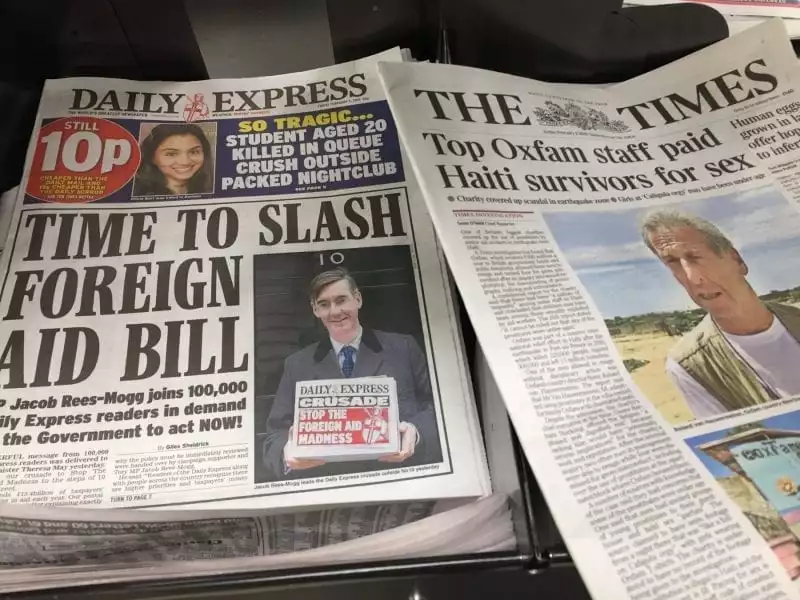Government threatens loss of funding to Oxfam over sex worker claims
International Development Secretary Penny Mordaunt has warned Oxfam that it could lose government funding over the allegations that some of the charity’s staff used sex workers in Haiti in 2011.
Criticising the charity for failing in its “moral leadership”, she told Andrew Marr on BBC TV that the no charity could be a government partner if it did not “have the moral leadership to do the right thing”. Oxfam received nearly £32 million in overseas aid funding from the UK government in the last financial year.
The claims resulted in four people being sacked and three resigning. Oxfam’s country director Roland van Hauwermeiren was one of those who resigned “after admitting having prostitutes visit his Oxfam villa” according to The Times. Oxfam had 230 staff in Haiti at the time, following the earthquake which had killed 22,000 people.
Advertisement
Oxfam, which had worked in Haiti since 1978, announced its investigation on 5 August 2011 – the BBC reported on it – and on 5 September announced its outcome.
The Times, however, revived the story on Friday and Saturday, adding allegations that Oxfam:
- “covered up the scandal in Haiti”
- “failed to warn aid agencies about [the] staff… allowing them to take jobs among vulnerable people in other disaster zones”
- had not provided a full disclosure to the Charity Commission at the time
Oxfam has denied any cover-up. Dame Barbara Stocking, CEO of Oxfam in 2011, also told the BBC “we didn’t hide anything”, adding that she had acted in a transparent manner.
The Charity Commission has asked Oxfam for more details. A spokesman said “Our approach to this matter would have been different had the full details reported been disclosed to us at the time”.
Oxfam’s senior staff have met with the International Development Secretary this morning to discuss the allegations and provide further details.
Further allegations
The story continues to dominate headlines today, with claims in The Times by Priti Patel MP, who ran the Department for International Development until last November, had raised concerns about other sexual abuse within the overseas aid sector but that these had not been followed up by officials. She claimed “predatory paedophiles” had infiltrated charities.
The Observer yesterday reported claims that Oxfam workers in Chad had also used sex workers in 2006. Roland van Hauwermeiren was country director in Chad at that time.
Other charities have also been named in the developing story:
But the questions raised by the scandal go beyond just charities. The Charity Commission and DFiD are being called on by some to justify their actions or lack of them.
Oxfam’s response
Oxfam’s current CEO Mark Goldring denied that it had covered up the allegations or its inquiry. He told BBC Radio 4’s Today programme: “We were very open with the public that we were ashamed of the behaviour of our staff. We still are.”
He acknowledged that with hindsight “I would much prefer that we had talked about sexual misconduct.”
Oxfam’s first statement on the allegations, on Friday, stated: “The behaviour of some members of Oxfam staff uncovered in Haiti in 2011 was totally unacceptable, contrary to our values and the high standards we expect of our staff.
“Our primary aim was always to root out and take action against those involved and we publicly announced, including to media, both the investigation and the action we took as a result.”
It answered criticisms over reporting the allegations to Haitian police, stating: “The legal advice we received in Haiti was that given the nature of the allegations, especially with the continued upheaval and chaos post the earthquake, it was extremely unlikely that reporting these incidents to the police would lead to any action being taken.”
It added that “Oxfam Trustees, the Charity Commission and DFID, as well as other major donors of our Haiti work including the EU, WHO and UN agencies, were kept informed of the investigation and its outcome.” It also reported that “the Charity Commission confirmed that Oxfam had taken appropriate action and that it therefore had “no regulatory concerns”.”
On Saturday the charity explained the actions it took following its 2011 inquiry.
It stated: “After the investigation in 2011 we carried out a thorough review of the case, which resulted in the creation of our dedicated safeguarding team, a confidential ‘whistleblowing’ hotline and safeguarding contact point within countries as part of a package of measures to ensure that we do all we can to protect our staff, prevent sexual abuse and misconduct happening in the first place, and improve how we handle any allegations.”
In 2011 the charity’s code of conduct prohibited sex with beneficiaries and anyone under 18. That was subsequently expanded to state: “I will also not exchange money, offers of employment, employment, goods or services for sex or sexual favours.”
Caroline Thomson, the charity’s chair of trustees, yesterday announced new measures that the charity was taking to enhance further safeguarding within Oxfam.
BOND, the UK network for organisations working in international development, added its comments on the reports. It stated that the actions reported were “completely deplorable and contrary to the values and high standards the development and humanitarian sector is rightly expected to adhere to.”
At the same time it argued: “we cannot allow the actions of a few to undermine the incredible work charities do to provide shelter, food and healthcare in some of the most difficult environments in the world, and often at desperate times for the world’s poorest people. These organisations are often the only lifeline for people facing conflict, climate change and extreme poverty.”
Save the Children’s Chief Executive, Kevin Watkins, has also announced that the charity, will be reviewing its safeguarding procedures.
Haiti’s response
Bocchit Edmond, Haiti’s ambassador in London, has criticised Oxfam for not sharing its findings with the Haitian authorities and called for it to apologise. He said: “I think Oxfam should look into itself deeply if they want to rebuild that trust they had.”
Supporters’ response
The Times’ report has generated international criticism of Oxfam for its handling of the scandal. The impact on supporters and their willingness to continue supporting the charity is yet to be seen.
James Daunt, MD of corporate partner Waterstones, said “I expect Oxfam to give a full and frank explanation, and if there is something to apologise for, to apologise.”
Others gave more forthright support for the charity and the values that these individuals have traduced. Paul Polman, CEO of Unilever, tweeted:
Other supporters reaffirmed their support:
The Guardian is asking for Oxfam supporters’ reactions to the allegations.
“Sensational press”
The reference to a sensational press was one of various attempts to put the coverage and the government’s reaction to it in a broader context.
The UK spends £13 billion a year on overseas aid, and is committed to contributing 0.7% of its gross national income on this work.
The overseas aid budget is criticised by various political groups, particularly so against the background of Brexit and continuing austerity.
Indeed, The Times’ first front page story on the Oxfam scandal appeared on the same day that The Daily Express’ front page called for overseas aid to be slashed. MP Jacob Rees-Mogg was depicted handing in a petition to 10 Downing Street asking the government to “stop the foreign aid madness”.

The government’s focus on criticising and investigating overseas aid charities also risks skewing the focus on how abusers might target any charity or organisation where they gain access to vulnerable people, including those in the UK. Third Sector reported on one such case.
Indeed, Oxfam has long been active on developing policies and practice around accountability and transparency. The need for focus and action in this area was highlighted by the Charity Commission which as recently as December 2017 called for greater attention by charities on the issue of safeguarding.
Save the Children’s Chief Executive Kevin Watkins also puts the criticisms of Oxfam’s response in a broader context.
He blogged: “The issues raised by the Haiti episode fit a broader pattern. Our societies have a systemic problem associated with male abuse of power. Sexual harassment and sexual violence are symptoms of a wider disease that has invaded our institutions – from schools, churches, broadcasters to political parties. Now the spotlight is on the aid sector.”
Why did it take nearly seven years for this scandal to become front page news, despite Oxfam’s efforts at transparency? Oxfam’s approach to social justice and poverty includes speaking truth to power. Just last month it highlighted wealth disparities as part of the Davos meeting.
NCVO’s Karl Wilding blogged with his analysis of the situation and dismissed these suggestions. He said: “Is the reporting an ideological attack, even if only in terms of the timing? I very much doubt it. More likely is that this story follows other stories on abuse.”






